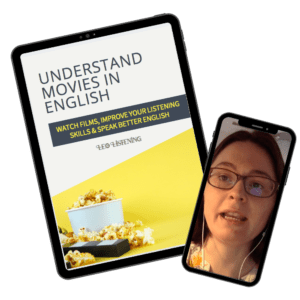How to Deal With Stressful Listening Situations

Updated September 2021
Let’s face it – listening is one of the most difficult skills to master when you’re learning a language.
When you read and write, words are on the page in front of you. They don’t go anywhere. You feel secure and comfortable.
When you’re listening, words come out of someone’s mouth and then they disappear. If you don’t catch them, you don’t know what you’ve just heard. You feel scared, nervous and awkward because it seems impossible to keep up with the spoken language.
The Inner Work Of Making Phone Calls In French
When I first moved to France and I had to make phone calls, it was both a mental and linguistic task. I had to check a few words in the dictionary if I was calling my landlord about a problem in the apartment, or a utility company (gas, electrics etc).
Once I’d dealt with the linguistic part, I still had to overcome the mental obstacles.
- What if I don’t understand them?
- What if they don’t understand me?
- Maybe I should just send an email
I used to rehearse what I was going to say to feel more confident. But it still took me a few minutes to feel brave enough to pick up the phone, dial the number and then hopefully understand.
I know you’re in the same place I was a few years ago. You’re doing the work. You read my blog so you’re going beyond just listening and you’re actually trying to understand by doing dictations, shadow readings, practising understanding weak forms. All the practical things I talk about here.
So, I decided it was time to go beyond the practical and focus more on the mindset side of things.
I’d like you to meet Sabrina from www.calmenglish.com, another online teaching colleague who helps professionals improve their spoken fluency and develop a more native sounding accent.

How To Use Mindfulness To Stay Calm When Listening To Fast English
Why is her website called calm English?
As you’ll discover in this interview, Sabrina uses mindfulness and meditation techniques to help her students become more fluent.
If you think that’s some New Age, hippy rubbish, think again. You can use these techniques without becoming a Buddhist monk and meditating for hours every day.
In fact, as you’ll find out, you can take just 10 seconds a day to become more mindful and present in what you’re doing, including with your English.
You’ll discover
- Some common misconceptions about mindfulness and meditation
- How to bring meditation into your daily life without dressing like a Buddhist monk and sitting cross-legged on the floor saying ‘ohm’
- How you can use meditation and mindfulness to deal with stressful listening situations
- Why you have to do the practical work first and then prepare the mind for these techniques to work
- How you can use these techniques to deal with scary moments like not catching a word
- Why perfection in spoken English is an illusion and how imperfection makes you sound normal
- Why it’s normal and healthy to ask your conversation partner for clarification, especially in professional situations
- What culture has to do with all this, especially in international teams
Useful Links
Some of the links we mentioned in our chat:
Positive Thinking: Everything you have always known about positive thinking but were afraid to put into practice by Vera Peiffer
More About Sabrina
Sabrina coaches business professionals to finally speak English fluently at Calm English. She believes that language is a tool we can use to reach professional goals and see big, adventurous dreams become reality.
If you’re ready to be a successful English speaker, speak English fluently, get the jobs and promotions you deserve and see your life improve with English get started with her free mini-guide to speaking English fluently here.
Subscribe To My Newsletter To Get Your Free Guide
Want to use your favourite movie or TV show to understand native English speakers when they talk fast? Download your free guide, Understand Movies in English.




Interesting conversation between you two English teachers , you both have a different approach how to make your students reach their goal in English learning , and from your guest Sabrina , I got an important and useful tip , trying to relax myself before any stressful test or proof and not only when I have to speak with someone in English , take a deep breath , being aware of my skills , doing some form of meditation, or at least keep it as simple as I can.
Hi Marco. Glad you enjoyed it. In fact, it was partly inspired by some of the things I learned in working with you and other learners on dictations. I realised that sometimes you doubt your interpretations because you assume you’ve misheard something when in fact you were correct. So that made me think about the impact of confidence and mindset on learning to understand spoken English.
Sabrina has been using some of my listening tips and techniques with her students and I also wanted to learn from her given her expertise in using mindfulness in teaching. You’re quite right about her advice: you need to do the work first, but then before or even during a potentially stressful situation (a speaking or listening one) you can take a few seconds to calm your nerves and remind yourself that you’ve done the work and that you’re going to be fine. I hope you’ll be able to put these tips into practice.
Very good material
Glad you found it useful Juan. Feel free to share it with others who you think would enjoy it.
We even need these techniques to prepare ourselves for our mother tongue as well, not referring to small talk of course.
Extremely useful and practical tips for all kinds of learners.
Thank you, both Cara and Sabrina for this interview!